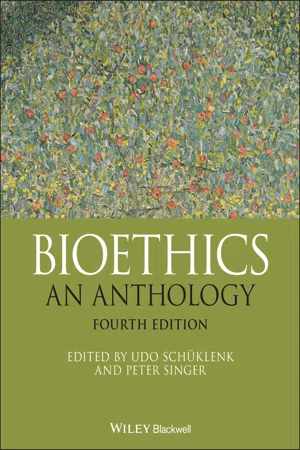
- English
- ePUB (mobile friendly)
- Available on iOS & Android
About this book
The new edition of the classic collection of key readings in bioethics, fully updated to reflect the latest developments and main issues in the field
For more than two decades, Bioethics: An Anthology has been widely regarded as the definitive single-volume compendium of seminal readings on both traditional and cutting-edge ethical issues in biology and medicine. Acclaimed for its scope and depth of coverage, this landmark work brings together compelling writings by internationally-renowned bioethicist to help readers develop a thorough understanding of the central ideas, critical issues, and current debate in the field.
Now fully revised and updated, the fourth edition contains a wealth of new content on ethical questions and controversies related to the COVID-19 pandemic, advances in CRISPR gene editing technology, physician-assisted death, public health and vaccinations, transgender children, medical aid in dying, the morality of ending the lives of newborns, and much more. Throughout the new edition, carefully selected essays explore a wide range of topics and offer diverse perspectives that underscore the interdisciplinary nature of bioethical study. Edited by two of the field's most respected scholars, Bioethics: An Anthology:
- Covers an unparalleled range of thematically-organized topics in a single volume
- Discusses recent high-profile cases, debates, and ethical issues
- Features three brand-new sections: Conscientious Objection, Academic Freedom and Research, and Disability
- Contains new essays on topics such as brain death, life and death decisions for the critically ill, experiments on humans and animals, neuroethics, and the use of drugs to ease the pain of unrequited love
- Includes a detailed index that allows the reader to easily find terms and topics of interest
Bioethics: An Anthology, Fourth Edition remains a must-have resource for all students, lecturers, and researchers studying the ethical implications of the health-related life sciences, and an invaluable reference for doctors, nurses, and other professionals working in health care and the biomedical sciences.
Tools to learn more effectively

Saving Books

Keyword Search

Annotating Text

Listen to it instead
Information
Part I
Abortion
Introduction
1
Abortion and Infanticide
I Abortion and Infanticide
Table of contents
- Cover
- Table of Contents
- Series Page
- Title Page
- Copyright Page
- Acknowledgments
- Introduction
- Part I: Abortion
- Introduction
- Part II: Issues in Reproduction
- Introduction
- Assisted Reproduction
- Prenatal Screening, Sex Selection, and Cloning
- Part III: Genetic Manipulation
- Introduction
- Part IV: Life and Death Issues
- Introduction
- Killing and Letting Die
- Newborns
- Brain Death
- Advance Directives
- Voluntary Euthanasia and Medically Assisted Suicide
- Part V: Resource Allocation
- Introduction
- Part VI: Obtaining Organs
- Introduction
- Part VII: Ethical Issues in Research
- Introduction
- Experimentation with Humans
- Experimentation with Animals
- Academic Freedom and Research
- Part VIII: Public Health Issues
- Introduction
- Part IX: Ethical Issues in the Practice of Healthcare
- Introduction
- When do Doctors have a Duty to Treat?
- Confidentiality
- Truth-Telling
- Informed Consent and Patient Autonomy
- Part X: Disability
- Introduction
- Part XI: Neuroethics
- Introduction
- Index
- End User License Agreement
Frequently asked questions
- Essential is ideal for learners and professionals who enjoy exploring a wide range of subjects. Access the Essential Library with 800,000+ trusted titles and best-sellers across business, personal growth, and the humanities. Includes unlimited reading time and Standard Read Aloud voice.
- Complete: Perfect for advanced learners and researchers needing full, unrestricted access. Unlock 1.4M+ books across hundreds of subjects, including academic and specialized titles. The Complete Plan also includes advanced features like Premium Read Aloud and Research Assistant.
Please note we cannot support devices running on iOS 13 and Android 7 or earlier. Learn more about using the app